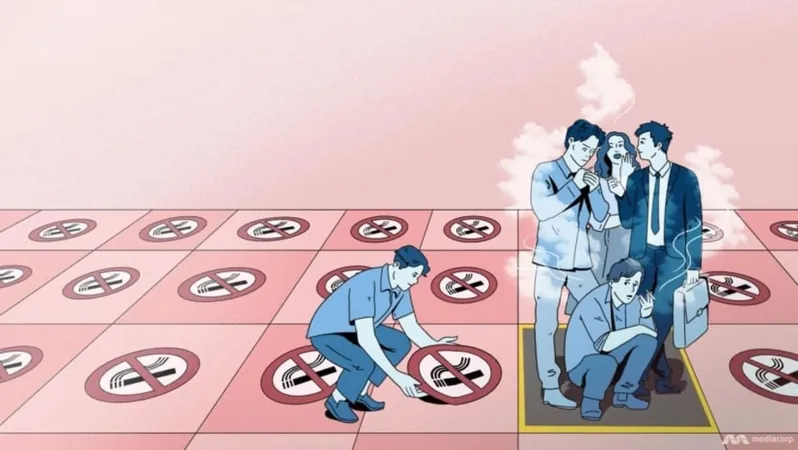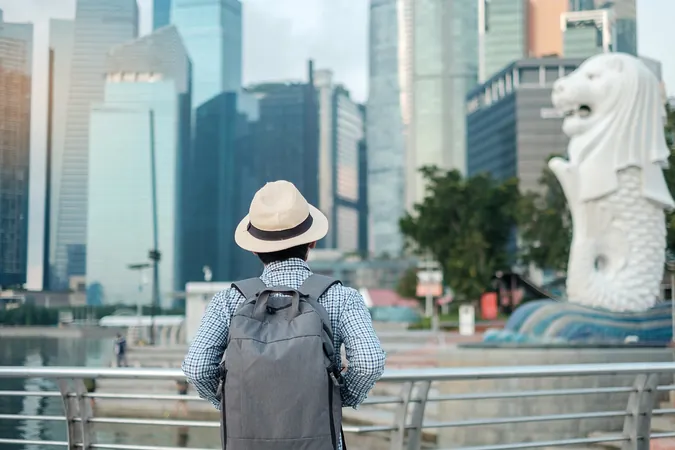
Singapore's Path to a Smoke-Free Future: Gains, Struggles, and What's Next
2024-09-29
SINGAPORE:
Kevin Wang, 32, transitioned from being a daily smoker in Paris to quitting once he arrived in Singapore in 2016. The shift, he says, was largely influenced by the country's stringent smoking regulations. “The environment in Singapore made it hard to smoke everywhere. Not seeing smokers all the time helped me to stay focused and not relapse,” he remarked.
Initially, Singapore's smoking bans included entertainment venues and educational institutions; those rules have since expanded significantly. Today, smoking is prohibited in parks, recreational beaches, and key areas like Orchard Road, where designated smoking zones are clearly marked. For Wang, these restrictions played a crucial role in helping him kick the habit.
However, the tightening of smoking regulations hasn't deterred every smoker. Salihan, an IT executive, finds the limited smoking zones in the Central Business District a nuisance. Instead of reducing his intake due to the ban, he compensates by smoking more during each allowed break.
The experiences of Wang and Salihan illustrate both the successes and challenges of Singapore’s smoking cessation efforts. According to the latest 2023 National Population Health Survey by the Ministry of Health, only 8.8% of Singapore residents smoke daily, a notable decline from 13.9% in 2010. While this reduction showcases the effectiveness of the outdoor smoking bans and progressive tobacco taxation, the persistence of that 8.8% indicates a deeply rooted addiction for many.
Singapore's battle against tobacco began in 1992, laying the groundwork with a Smoking (Prohibition in Certain Places) Act. Over the years, more premises have been added to the list of smoke-free zones, and in 2019, Orchard Road was declared entirely smoke-free. By 2022, smoking in public parks and beaches was also banned.
Despite these advances, many smokers are resistant to the country’s attempts to restrict their habit. Some have turned to vaping, which, although banned since 2018, continues to be an attractive alternative for nicotine seekers due to its perceived convenience. Recent enforcement actions at Changi Airport revealed a number of individuals caught with e-cigarettes, highlighting the ongoing challenge for authorities in curbing vaping.
Experts are concerned that the easy access to vaping products could lead to a new wave of nicotine addiction, especially among youths. Sean Ang, a smoking cessation specialist, fears we could shift from a society of cigarette smokers to one of vapers if measures aren't enhanced to control their spread.
To further combat smoking, Singapore could consider more robust strategies. Public health experts suggest reducing nicotine content in cigarettes and implementing strict flavor bans. Some have even recommended a generational approach, prohibiting purchases for anyone born after a specific year. Furthermore, expanding support systems, like providing greater access to nicotine replacement therapies, could assist those seeking to quit.
While the government continues to implement stricter measures, there's a pressing need to respect the choices of non-smokers and protect public health. MP Louis Ng has even proposed bans on smoking in close proximity to housing windows to safeguard residents from secondhand smoke.
As Singapore edges closer to its goal of becoming a smoke-free nation, the transformation involves more than just legislative action. Addressing the underlying issues driving individuals to smoke—such as stress and social pressures—remains a crucial element in this ongoing public health campaign. With a collective effort, Singapore can aspire not only to lower its smoking rates but to cultivate a healthier future for all.


 Brasil (PT)
Brasil (PT)
 Canada (EN)
Canada (EN)
 Chile (ES)
Chile (ES)
 España (ES)
España (ES)
 France (FR)
France (FR)
 Hong Kong (EN)
Hong Kong (EN)
 Italia (IT)
Italia (IT)
 日本 (JA)
日本 (JA)
 Magyarország (HU)
Magyarország (HU)
 Norge (NO)
Norge (NO)
 Polska (PL)
Polska (PL)
 Schweiz (DE)
Schweiz (DE)
 Singapore (EN)
Singapore (EN)
 Sverige (SV)
Sverige (SV)
 Suomi (FI)
Suomi (FI)
 Türkiye (TR)
Türkiye (TR)